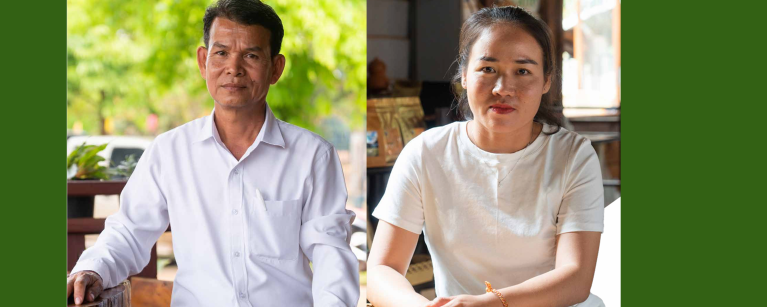SOLAR Project: Khamsouk Phommatham and Thipphakao Seehathep 73 Working with local government to boost social security awareness in rural areas: Making strides in the Lao People’s Democratic Republic

Khamsouk Phommatham and Thipphakao Seehathep 73 Working with local government to boost social security awareness in rural areas: Making strides in the Lao People’s Democratic Republic that membership can confer.
In the Lao People’s Democratic Republic, social security membership can grant you access to free healthcare and provide you with a pension in old age. That may sound like a good deal, but it can still be a challenge to get people enrolled, particularly in rural areas. In the Lao province of Salavan, social security membership is a relatively new concept – new enough that many farming communities don’t really know much, if anything, about it. In addition, incomes tend to be low in the rural areas of the province, which can make people anxious about the idea of handing over a portion of their already meagre earnings, even with the benefits. So how do you convince people to join a scheme that they don’t understand or fear they cannot afford? And how do you combat misinformation about social security? These are challenges that have faced the Salavan Province Social Security Office for years.
Sitting recently at a popular café in the town of Laongam, Khamsouk Phommatham, the head of the Provincial Social Security Office, spoke of the benefits of the social security scheme, as well as the challenges that his Office faces in promoting it.
“Today, anyone can join the social security scheme,” he said. “Membership in the scheme can make people’s lives easier and less problematic. In most rural areas, people do not want to go to a hospital because of the costs. But social security covers these costs.” Even so, the majority of the villagers have not registered in the social security scheme, he said, as most do not understand how the system works or how it can benefit them.
“Some people are [also] given system offers them security and wrong information about the scheme and hear from their friends that the services provided are not good,” he noted. “Stories about discriminatory treatment in hospitals are common, such as reports that you’ll only be given paracetamol if you need medication.”
Recognizing the difficulties faced by the authorities, the SOLAR Project – a European Union-funded initiative implemented by the ILO and Oxfam – recently funded a pilot in the southern provinces of the Lao People’s Democratic Republic to help local authorities to publicize the benefits of the social security scheme and to bring the services closer to farmers.
Thipphakao Seehathep, a Technical Officer at the Salavan Provincial Social Security Office, spoke of the success that the pilot programme has had so far. “To begin with, villagers were afraid of us because they thought we would take their money and cheat them somehow, but SOLAR Project staff organized a workshop to encourage people to subscribe to the scheme. They explained how the social security system offers them security and how they can sign up using a mobile registration service in the village, which made it easy for people to access the system.
“Now we know how to communicate with villagers more effectively. A lot more people signed up when we provided them with registration facilities and this year we have 118 members in ten villages,” she said. SOLAR Project staff think that this year more people will subscribe, because villagers now have a better understanding of what is involved and talk to their friends and neighbours about what actually happens when they visit a hospital and use their membership card But the pilot is ultimately less about directly getting rural people enrolled in social security and more about giving Social Security Office staff the tools they need to continue reaching out to the communities they serve over the long term.
For Thipphakao, her experience with the pilot has been transformative. “Communication training supported by SOLAR is very helpful for our work, especially for me, as I did not have any experience of communicating with authorities, companies and villagers in ways that ensure they listen and understand what we are trying to do for them,” she said.